|
|
|
Sort Order |
|
|
|
Items / Page
|
|
|
|
|
|
|
| Srl | Item |
| 1 |
ID:
039072
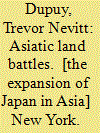

|
|
|
|
|
| Publication |
New York, Franklin Walts, Inc., 1963.
|
| Description |
68p.Hbk
|
| Series |
Military History of World War II
|
| Contents |
Vol. VIII
|
|
|
|
|
|
|
|
|
|
|
|
Copies: C:1/I:0,R:0,Q:0
Circulation
| Accession# | Call# | Current Location | Status | Policy | Location |
| 008100 | 940.54/DUP 008100 | Main | On Shelf | General | |
|
|
|
|
| 2 |
ID:
029650
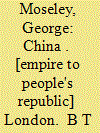

|
|
|
|
|
| Publication |
London, B.T. Batsford Ltd., 1968.
|
| Description |
192p.hbk
|
|
|
|
|
|
|
|
|
|
|
|
Copies: C:1/I:0,R:0,Q:0
Circulation
| Accession# | Call# | Current Location | Status | Policy | Location |
| 001906 | 951.04/MOS 001906 | Main | On Shelf | General | |
|
|
|
|
| 3 |
ID:
031989


|
|
|
|
|
| Publication |
New York, McGraw-Hill Book Company, 1969.
|
| Description |
159p.pbk
|
|
|
|
|
|
|
|
|
|
|
|
Copies: C:1/I:0,R:0,Q:0
Circulation
| Accession# | Call# | Current Location | Status | Policy | Location |
| 009018 | 951.05/ROB 009018 | Main | On Shelf | General | |
|
|
|
|
| 4 |
ID:
029649
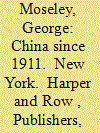

|
|
|
|
|
| Publication |
New York, Harper& Row , Publishers., 1969.
|
| Description |
192p.hbk
|
|
|
|
|
|
|
|
|
|
|
|
Copies: C:1/I:0,R:0,Q:0
Circulation
| Accession# | Call# | Current Location | Status | Policy | Location |
| 004642 | 951.04/MOS 004642 | Main | On Shelf | General | |
|
|
|
|
| 5 |
ID:
123909
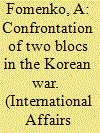

|
|
|
|
|
| Publication |
2013.
|
| Summary/Abstract |
IN THE LATTER HALF of the 1940s, due to Japan's defeat in World War the political landscape in the Far East significantly changed the balance of forces seeking political domination in this part of the world.
Leaders of all democratic victor nations, simultaneously but for different reasons, shifted their support from Chiang Kai-shek and his government of "reactionary" Nationalists to "progressive" Chinese Communists.
|
|
|
|
|
|
|
|
|
|
|
|
|
|
|
|
| 6 |
ID:
118591
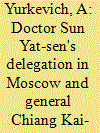

|
|
|
|
|
| Publication |
2012.
|
| Summary/Abstract |
The author believes that the turning point in the career of Chiang Kai-shek, who had no significant authority in China's political and military circles in the early 1920s, was when he became the head of "Doctor Sun Yat-sen's Delegation" which visited Moscow in the autumn of 1923. The success of the mission helped Chiang Kai-shek take the post of the Commandant of the Whampoa Military Academy and subsequently set up military units under his command.
|
|
|
|
|
|
|
|
|
|
|
|
|
|
|
|
| 7 |
ID:
107693
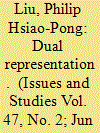

|
|
|
|
|
| Publication |
2011.
|
| Summary/Abstract |
Current studies of Chinese representation in the United Nations assume that the Republic of China's expulsion was inevitable because of Chang Kai-shek's one China principle and Beings role in U.S. foreign policy. This paper provides another perspective on this event by mapping hoe the United States, using a two Chinas strategy, endeavored to secure Taipei's seat and how Chiang Kai-slick faithfully executed this plan.
|
|
|
|
|
|
|
|
|
|
|
|
|
|
|
|
| 8 |
ID:
153766
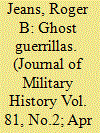

|
|
|
|
|
| Summary/Abstract |
After a protracted struggle, in 1949 the Chinese Communists defeated Chiang Kai-shek’s Nationalist armies and took control of the mainland. After the possibility of recognition of the new regime was dashed by Communist mistreatment of American diplomats and other U.S. citizens, the U.S. government adopted a strong anticommunist position. Disgusted with Chiang and his Chinese Nationalist Party, it also turned its back on its wartime ally. Thus opposed to both Communists and Nationalists even before the final Communist victory, it launched a search for viable “third forces” (neither Communist nor Nationalist) it could support instead. Far from an “abstraction,” this quest constituted a powerful theme in the approaches of the Central Intelligence Agency (CIA) and State Department to China during the early 1950s.
|
|
|
|
|
|
|
|
|
|
|
|
|
|
|
|
| 9 |
ID:
111772
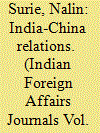

|
|
|
| 10 |
ID:
133738
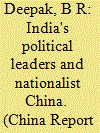

|
|
|
|
|
| Publication |
2014.
|
| Summary/Abstract |
This article discusses how, owing to the commonalities in thoughts and actions of Indian and Chinese nationalists, they forged close ties not only at the individual, but also at the organizational, levels. It posits that while the early Indian nationalists sought to pursue the path of armed struggle to dislodge the British from India, in the second phase leaders of the Indian National Congress (INC) sought to establish links with the Kuomintang (KMT), the ruling party in China. The Indian leadership, especially Nehru, was of the view that there was much in common in the struggle carried out in different colonial countries, including the unification drive in China in the 1920s, and that therefore there was a need to forge close ties to support each other's struggles. It was this thinking of Nehru and others national leaders including Gandhi that culminated in Nehru's China visit in 1939 and Chiang Kai-shek's India visit in 1942, although Chiang's prime objective was to muster India's support for the Allied war effort. The quest for alliance with China did not die out even after the Chinese Revolution; however, developments that unfolded thereafter led in a different direction.
|
|
|
|
|
|
|
|
|
|
|
|
|
|
|
|
| 11 |
ID:
036578
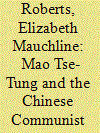

|
|
|
|
|
| Publication |
London, Methuen and co. ltd., 1970.
|
| Description |
96p.Hbk
|
| Standard Number |
423422804
|
|
|
|
|
|
|
|
|
|
|
|
Copies: C:1/I:0,R:0,Q:0
Circulation
| Accession# | Call# | Current Location | Status | Policy | Location |
| 004582 | 923.151/ROB 004582 | Main | On Shelf | General | |
|
|
|
|
| 12 |
ID:
100652
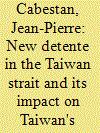

|
|
|
| 13 |
ID:
041946
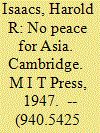

|
|
|
|
|
| Publication |
Cambridge, M I T Press, 1947.
|
| Description |
xxix, 295p.Pbk
|
|
|
|
|
|
|
|
|
|
|
|
Copies: C:1/I:0,R:0,Q:0
Circulation
| Accession# | Call# | Current Location | Status | Policy | Location |
| 001899 | 940.5425/ISA 001899 | Main | On Shelf | General | |
|
|
|
|
| 14 |
ID:
029140
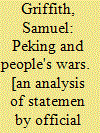

|
|
|
|
|
| Publication |
London, Pall Mall Press, 1966.
|
| Description |
142p.hbk
|
|
|
|
|
|
|
|
|
|
|
|
Copies: C:1/I:0,R:0,Q:0
Circulation
| Accession# | Call# | Current Location | Status | Policy | Location |
| 000037 | 951.05/GRI 000037 | Main | On Shelf | General | |
|
|
|
|
| 15 |
ID:
038703
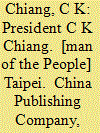

|
|
|
|
|
| Publication |
Taipei, China Publishing Company, 1978.
|
| Description |
64p.:images.Hbk
|
|
|
|
|
|
|
|
|
|
|
|
Copies: C:1/I:0,R:0,Q:0
Circulation
| Accession# | Call# | Current Location | Status | Policy | Location |
| 021471 | 923.151/CHI 021471 | Main | On Shelf | General | |
|
|
|
|
| 16 |
ID:
175974
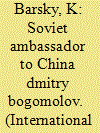

|
|
|
|
|
| Summary/Abstract |
AFTER THE SOVIET UNION and the Republic of China restored diplomatic relations in 1932,1 the USSR's foreign ministry - the People's Commissariat for Foreign Affairs (NKID) - began to ponder who to appoint as the plenipotentiary representative (ambassador).
|
|
|
|
|
|
|
|
|
|
|
|
|
|
|
|
| 17 |
ID:
174530
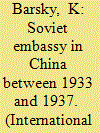

|
|
|
|
|
| Summary/Abstract |
ON AUGUST 21, 1937, the Soviet plenipotentiary representative (ambassador) to China, Dmitry Bogomolov, and the foreign minister of the Republic of China, Wang Chonghui,1 signed the Sino-Soviet Non-Aggression Pact in a ceremony in Nanjing (Nanking). The pact was a great achievement for Soviet diplomacy. However, at the beginning of October, Bogomolov was recalled to Moscow and arrested. He was falsely charged with Trotskyism and "participation in an anti-Soviet terrorist organization." On May 7, 1938, he was executed.
|
|
|
|
|
|
|
|
|
|
|
|
|
|
|
|
| 18 |
ID:
101677
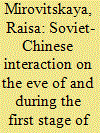

|
|
|
|
|
| Publication |
2010.
|
| Summary/Abstract |
The author shows that the main factor which influenced the Soviet-Chinese relations in 1937-1941 was the war unleashed by Japan against China. Having adopted a decision to render China a broad military-technical, diplomatic, moral and political assistance, the Soviet leadership took into account the fact that the growing Japanese aggression in China led to a further change in the balance of forces in the region, creating a real threat to the security of the Soviet Union.
|
|
|
|
|
|
|
|
|
|
|
|
|
|
|
|
| 19 |
ID:
128032
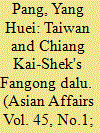

|
|
|
|
|
| Publication |
2014.
|
| Summary/Abstract |
For much of the 1950s, ROC President Chiang Kai-shek tried to formulate viable "counteroffensive" plans to reclaim mainland China. A main part of this vision was to attract US military sponsorship; for the ROC conspicuously lacked the military strength to reconquer mainland China. However, the formulation of these plans had unintended results for Taiwan. Firstly, the military plans gave Chiang's subordinates an indirect way of stating the impossibility of returning to mainland China, while strenuously proclaiming their loyalty. Secondly, Chiang Kai-shek's admonishment "????" Wu Wang Zai Ju (Forget Not the time at Ju), the clarion call for the ROC's mainland counter offensive, unwittingly promoted a more sedentary form of national identity for the average Taiwanese. Finally, the more Taiwan developed economically by means of US aid, the more the Taiwanese silently distanced themselves from Chiang's Quixotic dream of reclaiming mainland China. Thus, Chiang's leadership in "counteroffensive" planning did more to distance the island state from the mainland than "reclaim" it.
|
|
|
|
|
|
|
|
|
|
|
|
|
|
|
|
| 20 |
ID:
086305
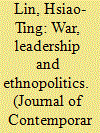

|
|
|
|
|
| Publication |
2009.
|
| Summary/Abstract |
This article examines how China's war with Japan served as a crucial factor that shaped modern China's ethnopolitics. It argues that the Japanese invasion of China in 1941-1945 provided the Nationalists with an unprecedented opportunity to push their authority further westward into the Central Asian heartlands. The Nationalists' marching westward as a result of the Japanese invasion also urged them to factor frontier and ethnopolitics into their wartime strategic thinking and institutional reforms. To a great extent, the war and its repercussions caused a redefinition of modern China's border security and defense in both northwestern and southwestern China. The war with Japan turned the Nationalists westward, a new perspective which shifted the power relationship between the Nationalists and China's frontier regional leaders. This historical phenomenon resulted in the extension of Nationalist power to, and the building of, new institutions and infrastructures, in China's remotest ethnic frontier. It also contributed to modern China's first contact with the Middle East. The westward expansion during wartime also transformed modern China from a maritime economy rooted in East Asian trade to a continental one based on overland trade routes through the heartland of Asia.
|
|
|
|
|
|
|
|
|
|
|
|
|
|
|
|
|
|
|
|
|